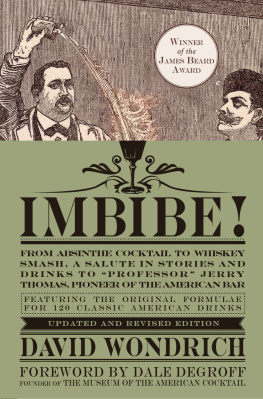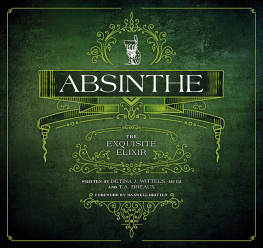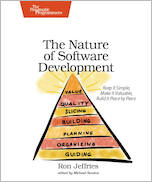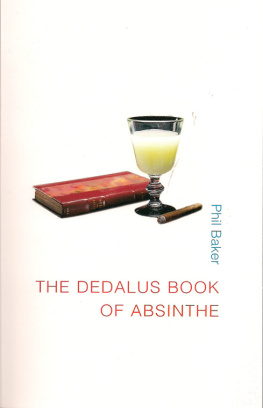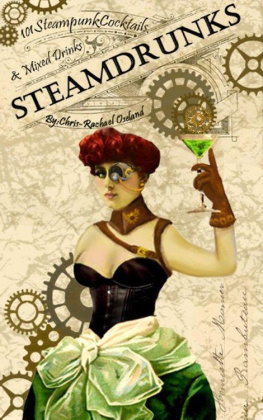Legal Info About Distilling Absinthe
Before even considering the idea of making absinthe on one's own there are a few important facts to be aware of. First and foremost, it is important to understand that if it has not been distilled then it simply isn t absinthe. One cannot soak wormwood in vodka or any other alcohol and call it absinthe without distilling it at some point. There are unscrupulous people out there who would like you believe otherwise in order to sell their vodka soak absinthe kits but understand that this is not real absinthe in any sense of the word.
The next thing one should be aware of is that in many countries it is illegal to distill alcohol for "beverage" purposes without first obtaining the proper license or licenses to do so. This eBook is intended as an informational source on the subject of distilling alcohol specifically as it relates to absinthe, a practice that, without proper compliance with national and local government regulations, is against the law in many countries, including the United States and Canada. If you live in the United States or Canada, licenses will be needed on the Federal, State, and perhaps even on a municipal level to distill alcohol for beverage purposes legally. The author and publishers of this eBook urge you to determine and follow the letter of your nation s laws in this regard. The author and publishers will not be held responsible for any claims, damages, losses that may result from using information in this eBook in any way that is noncompliant with any and all applicable regulations. Further, know that obtaining a license or licenses can be rather cumbersome task and involve a lot of red tape and possible expense. While it is true that there are multitudes of citizens out there brewing their own absinthe and other distilled spirits without obtaining the proper licenses, it is no excuse for breaking the law and the writer does not endorse or encourage any illegal activity in this respect. It is certainly is possible to obtain the proper licenses - I have friends who have done it.
Consider the question: Outside of it's legality, is it morally wrong to distill alcohol at home for personal use without a license? If you were to ask me I'd have to answer that with a resounding "no." Personally, I think any law that would prohibit a person from distilling a small amount of alcohol at home on a hobby basis to be a ridiculous intervention of the government in the harmless, private activities of its citizens. From the time Prohibition ended in 1933 until as late as 1979 it was actually illegal for a person in the United States to make his or her own beer or wine at home! The principals of distilling alcohol at home are so basic that one could almost do it unintentionally. For example, if you were to leave a jar of apple wine (or any wine actually) outside on a cold winters night and it happened to freeze over (water freezes at a lower temperature than alcohol), and if you then removed the water ice floating on top, did you know that what you would be left with is known as applejack and that it would technically be an illegal distillation if you didn't have a license to do so? Pretty ridiculous isn't it? Regardless of what anyone may think about home distillation, however, what the law says about it may be an entirely different thing. While I am not aware that the United States government is actively seeking out and prosecuting home distillers who make small amounts of alcohol for personal beverage consumption without the proper licenses, be aware that they certainly could if they wanted to.
If you read and comprehend the information here you will know how to make real absinthe at home. Not the fake stuff but the real deal. The same beverage that Oscar Wilde, Ernest Hemingway, Vincent Van Gogh, and a multitude of other famous and not-so-famous people used to drink. Keep in mind, however, that this guide is informational in nature. I have no idea where you may be reading this from and the laws will most certainly vary depending on where you live. Brewing absinthe is not an illegal activity provided you have the proper licenses to do so. So if you live in an area where licenses are needed, I would encourage you to obtain them before starting.
Further, if you were to follow the information herein and actually make a distillation it would require that you heat things up and do various other activities that could, if one were not to use common sense, potentially cause damage or injury. Because these things are completely out of the writer s control the reader assumes all responsibility for any actions that may incur should he or she follow the theories and information laid out in this eBook. With that out of the way, let s discuss absinthe brewing!
About This Guide
While my intention is not to make anyone angry, the fact that this manual is now available to the general public could possibly ruffle a few feathers in the absinthe community. The first people who might be miffed are those who make and sell absinthe commercially. You can't really blame them though; they've had to invest large sums of money and jump through quite a lot of legal hoops to bring real absinthe to the commercial market again. For that reason alone I would suggest that you purchase some of their products, provided of course that that they are good. I would pretty much consider this a necessity for those who have never tried absinthe before.
Another group of people who might not be too happy about seeing this guide available to general public are a few (but not all) of those homebrew purists who spent many years re-discovering and re-developing some of the techniques I am about to describe to you. I'm sure some of them would prefer to keep this subject to themselves. Keep in mind; much effort was put into this endeavor. Because home distillation (especially of an up-until-recently banned substance) without the proper licenses can be an illegal activity and most home-brew absinthe distillers ( HG ers as they are usually known) did not have said licenses, they were and still are out of necessity a very closed and secretive bunch. While discussions on the distillation of whisky at home are quite easy to find on the Internet, discussions on the distillation of absinthe are much more secretive, or at least they were until recently.
There s a lot of folklore and misinformation floating around on the subject of absinthe, especially on the Internet. Most people do not know what absinthe really is. A lot of people think it s a psychotic drink that causes people to hallucinate (it doesn't). Many have heard (incorrectly) that Vincent Van Gogh cut off his own ear because he was tripping on absinthe. Perhaps you are one of those who bought a bottle of a neon green absinthe made in an Eastern European country and wondered why it was almost undrinkable? Or maybe you have seen one of many numerous YouTube videos of college kids setting absinthe on fire, drinking it, and acting like they were on a psychedelic trip. The main purpose of this guide is to show the layman how absinthe can be made, not to try and dispel all of the numerous ridiculous myths about absinthe - that alone would be a full-length book. There are plenty of easy to find resources online that cover the history and myths of absinthe, I would highly recommend that you read the well-written overview about the subject of absinthe at Wikipedia. If you are new to absinthe, for now be aware that most of what you may have heard about it is probably based on hype.
I will, however, make a point to dispel myths on how absinthe is made when appropriate. Yes, good absinthe can be made at home. Not the mediocre stuff sometimes found at the store if one is lucky, but absinthe that rivals anything that can purchased anywhere. Unlike 10 years ago it is now possible to buy a fair quality bottle of commercial absinthe in a well-stocked liquor store if one looks hard enough for it. While it probably won't be stellar absinthe, at least it can be considered real. If one is willing to part with $60 to $120 US dollars, an above average to very high quality absinthe can now be found online without too much difficulty. That s about $40 to $100 dollars more than one would need to spend if they know how to brew their own, however.


